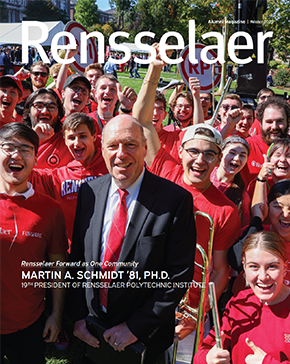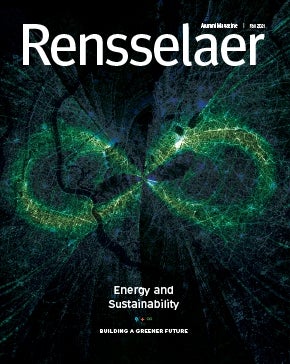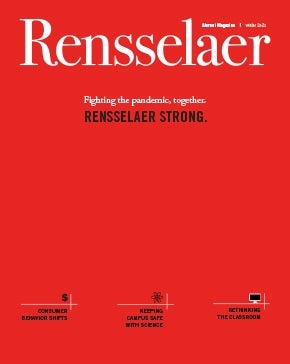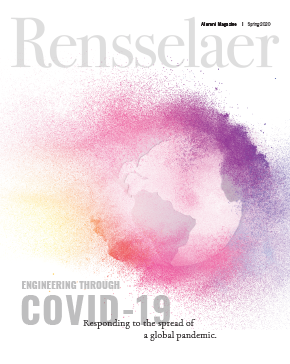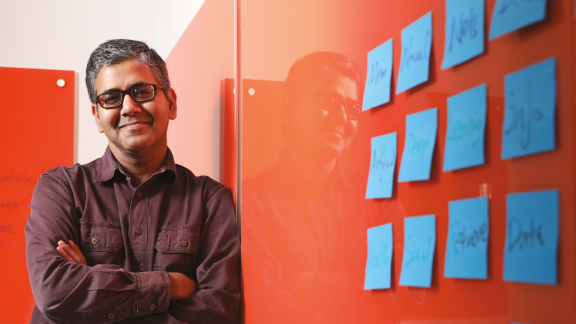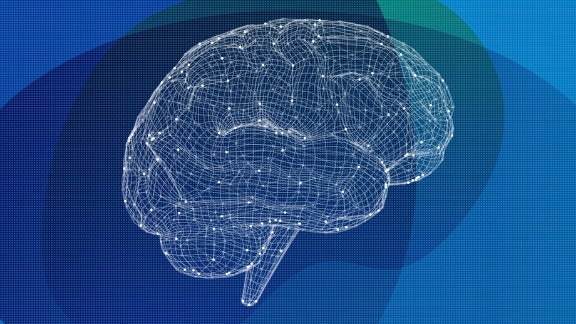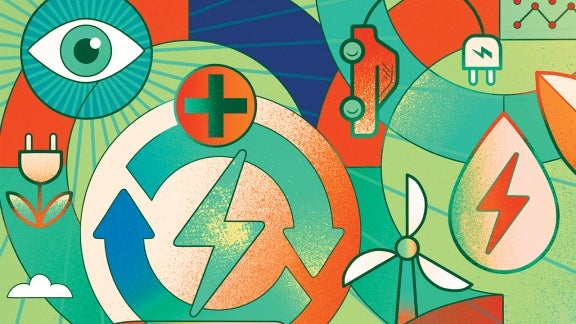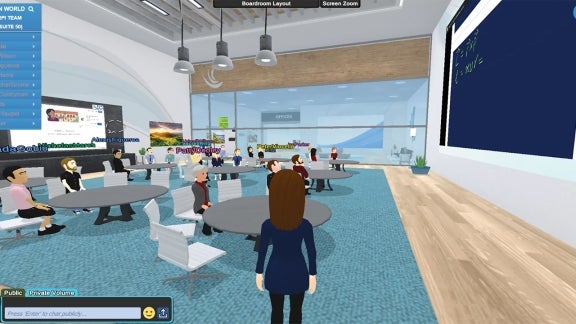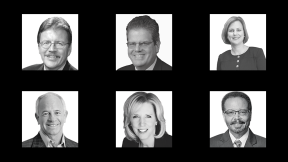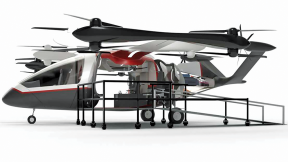
PRESIDENT'S VIEW • SHIRLEY ANN JACKSON, PH.D.
Anticipating the Future
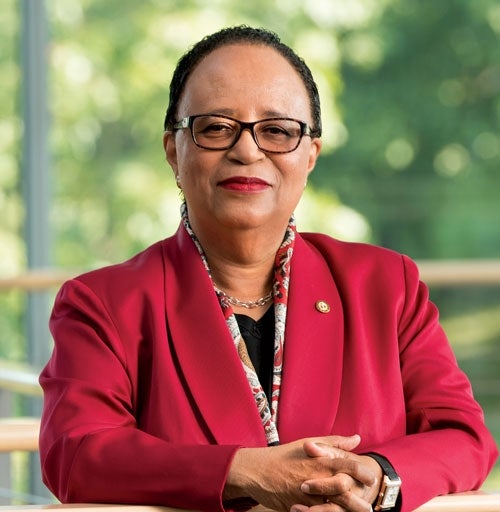
Heading into our third century, Rensselaer people continue to conceive ways to change the world.
It has been my great privilege to serve as President of Rensselaer Polytechnic Institute for 20 years. As we celebrate the accomplishments of the last two decades — and you will find them throughout this issue of Rensselaer magazine — we must remember why we were able to accomplish so much. We were willing, always, to anticipate the future — indeed, to rush out to meet it, fully intending to shape that future.
Today, the world is in flux. Shifting geopolitics, climate change, and transformative technologies are proving profoundly disruptive for societies around the world, and for universities such as ours. Yet within every great challenge lie great opportunities. At Rensselaer, we are surveying the landscape before us, and seizing those opportunities.
We are keenly aware, for example, that after decades in which the world seemed to be flattening, it is no longer converging in terms of shared values and institutions. There is a new distrust of international institutions among those who feel globalization has left them behind.
There are new tensions among the major powers, including trade tensions, and cyberspace has been called an “unregulated battlefield” by the World Economic Forum.
At the same time, it has become apparent that the catastrophic effects of climate change are no longer a future threat, but a presence, now, in all of our lives. At about 1 degree Celsius of global warming over pre-industrial levels, we are already seeing extreme storms, flooding both coastal and inland, droughts, devastating forest fires, increases in vector-borne diseases, crop failures, dying coral reefs, retreating glaciers, and melting sea ice in both the Arctic and Antarctica.
In October 2018, the United Nations International Panel on Climate Change (IPCC) issued a special report considering the impact of global warming of 1.5 degrees Celsius, which, without concerted action, we could reach as early as 2030 — but which would not prove as devastating as a 2-degree rise. The IPCC noted that limiting global warming to 1.5 degrees Celsius would require “rapid and far-reaching transitions” in the world’s systems for energy, land, cities and infrastructure, and industry.
Many of our faculty and students are doing groundbreaking work to speed such transitions, and to devise more energy efficient and sustainable fuels, processes, structures, and cities.
To support such efforts as the world population grows, and grows more urban, we have created a new Institute for Energy, the Built Environment, and Smart Systems (EBESS), an interdisciplinary partnership among our Brooklyn-based Center for Architecture Science and Ecology (CASE), our School of Engineering, and the Brooklyn Law School. The Institute is re-envisioning and designing integrated urban environments for human well-being and sustainability, with autonomous buildings that use renewable energy to meet their own needs, rather than relying on a centralized energy infrastructure, connected to autonomous intelligent systems that range from communications networks to transportation.
As humanity strives to decarbonize and the transport sector electrifies, new critical resources are emerging, including key materials for lithium-ion batteries, some of which are concentrated in a very few nations, creating the risk of price and supply chain shocks if other sources or substitutes are not found. Our researchers recently have devised a way to employ vanadium disulfide as a cathode, rather than the commonly used lithium cobalt oxide, to create a lithium-ion battery that has higher energy density, charges more quickly, and is less toxic.
“We are helping our students to develop the intellectual agility, multicultural sophistication, and the global view required for leadership in the world that is taking shape before us.”

We are also finding creative ways to overcome distinct challenges in higher education. With The Arch, we have found a way to expand our capacity by admitting larger classes and making more efficient use year-round of our infrastructure, while deepening the education we offer our students. Under The Arch, all rising juniors now spend the summer after their sophomore year on campus for a full semester’s worth of classes, so that they can then spend one semester of the traditional junior year away on an intellectual adventure uniquely suited to them. And with our Transformative: Campaign for Global Change, we are working to create an endowment to bridge the gap between the cost of educating our students and their ability to pay.
The world is diverging demographically, with the developed world growing old and the developing world experiencing a youth boom. By 2030, much of Africa will have a median population age under 20, while China, Russia, Japan, and European nations will have median ages more than twice that. Before 2050, Nigeria will have overtaken the United States to become the third most populous nation on Earth, behind India and China.
At Rensselaer, we take the global view, and see opportunities to work with our counterparts in emerging economies, to help them develop their capacity in education and research, and to identify exchanges that would benefit our faculty and students.
In the developed world, a scarcity of people of working age in the future will make it challenging to maintain GDP growth. The productivity growth brought on by advances in artificial intelligence and robotics may be crucial here. These are fields in which Rensselaer already leads and is expanding its leadership. In partnership with IBM, we have created a new Artificial Intelligence Research Collaboration (AIRC) designed to advance the science of artificial intelligence, and are recruiting professors with expertise in artificial intelligence in all five of our schools.
At the same time, as we move into a world in which many more people work alongside smart machines and are made more productive by them, those qualities that cannot be automated, such as creativity and empathy, are likely to become even more valuable. With initiatives such as Art_X @ Rensselaer, we have infused the perspectives of the arts and humanities through our curriculum, helping our students to develop the intellectual agility, multicultural sophistication, and the global view required for leadership in the world that is taking shape before us.
Ultimately, as we anticipate the 200th anniversary of our founding in 2024, we are following in the great Rensselaer tradition of never resting on our laurels. The future is the true province of Rensselaer people. We always are asking ourselves how the world is changing, so we can change the world.
